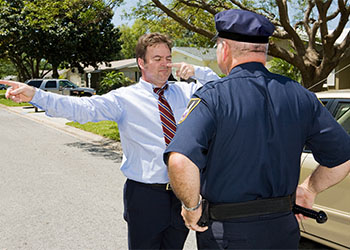Can a DUI Test Result in a False Positive?
May 26, 2023
 If you have been pulled over for drunk driving, you already know how serious the DUI charges can be. But imagine being charged with a DUI when you have not had a single drink. Unfortunately, this happens more often than you would think due to a false positive on a DUI test. A false positive can have devastating consequences, but it is a mistake that can be contested.
If you have been pulled over for drunk driving, you already know how serious the DUI charges can be. But imagine being charged with a DUI when you have not had a single drink. Unfortunately, this happens more often than you would think due to a false positive on a DUI test. A false positive can have devastating consequences, but it is a mistake that can be contested.
As a criminal defense attorney at Watkins Law Firm LLC, I can help you challenge your DUI charges if the evidence against you includes a false positive test. From my office in Boulder, Colorado, I serve clients in Lafayette, Louisville, Broomfield, and Longmont.
False Positives for DUI Tests
A false positive occurs when a DUI test shows that a person has a blood alcohol concentration (BAC) above the legal limit, even though they are not under the influence of alcohol. According to the website of the Colorado General Assembly, Colorado law prohibits motorists from operating a vehicle when their BAC is .08% or higher or when their ability to drive is impaired by alcohol or drugs.
If you are wrongly accused of a DUI because of a false positive, it is crucial that you seek legal representation immediately to contest the charge. An experienced attorney can conduct a thorough investigation of the circumstances surrounding your arrest, including the calibration of the testing equipment. Your attorney may then petition to have the test results excluded as evidence in your case or to have the charges dismissed entirely. Your attorney may also work to mitigate any penalties that you may be facing, such as license suspension or fines.
Possible Reasons for a False Positive
There are a number of reasons why DUI tests may produce false positives.
1. Inadequate calibration of equipment
One of the most common reasons for a false positive is the inadequacy of calibration of devices used for testing blood alcohol content. If the device is not appropriately calibrated, it can detect higher amounts of alcohol than the individual has consumed, leading to a false positive result.
2. Human error issues
Even with the most advanced machines and equipment, human error can cause issues concerning false-positive readings. There are a set of strict guidelines and protocols for administering breathalyzers, and individuals administering the test must follow the set guidelines for a correct reading.
3. Medical conditions
There are a few medical reasons why an individual may register a false positive. Conditions like Gastroesophageal reflux disease (GERD), chronic obstructive pulmonary disease (COPD), and diabetes can influence breath-based tests and show an incorrect reading. If someone has these or any other medical condition, they must inform the officer administering the test.
4. Blood alcohol rising
Alcohol takes time to metabolize, so if someone is tested for alcohol consumption too soon after their last drink, it could lead to a false positive. Blood alcohol levels tend to rise as alcohol is metabolized.
5. Alcohol-containing products
If an individual has consumed mouthwash, cough syrup, or anything containing alcohol, it can lead to a false positive if tested too soon after consumption. Mouthwash, cough syrup, or any similar products contain alcohol, which can show up during a breathalyzer test and lead to incorrect results.
6. Contamination
A breathalyzer test can also register false positives if there is any environmental contamination, like paint fumes, perfume, or cleaning chemicals in the air. The breathalyzer can detect these substances as alcohol and lead to false positives.
7. Medication
Certain prescription medicines, over-the-counter (OTC) medicines, and herbal remedies can cause a false positive during a breathalyzer test. For instance, asthma medications containing theophylline or cough syrups may have alcohol content. Some medicines can even entirely dilute the alcohol in the bloodstream.
8. Eating certain foods
Foods with high sugar content, such as fruits or sweets, can cause a false positive on a breathalyzer test. These foods contain yeast, which can cause high levels of ethanol in the atmosphere, leading to a positive reading. Foods containing vinegar, such as pickles or olives, can also cause this issue.
Skilled & Strategic Legal Counsel
If you are facing drunk driving charges but you did not drink, you need the assistance of a skilled attorney to help you contest the findings of the test and ensure that your rights are protected. At Watkins Law Firm LLC, I can help you fight back against a false positive in your case. Get in touch today to schedule a free case evaluation.